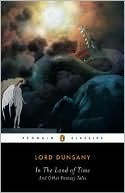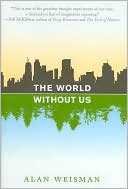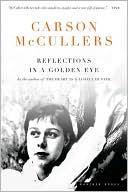Book Reviews: In the Land of Time and Other Fantasy Tales, The World Without Us, Reflections in A Golden Eye
Haven't posted much lately, but I did write some quick and dirty reviews for my new (and, I suppose, freakishly unabandoned) Goodreads account. Thought I might as well get double-duty out of them and post them here.
 In the Land of Time: And Other Fantasy Tales by Lord Dunsany
In the Land of Time: And Other Fantasy Tales by Lord Dunsany
This collection isn't perfect: it's too much for one book, and not every piece is equally strong. I do not recommend reading the book cover to cover! But as a survey of the many phases of Dunsany's work, it's very impressive. Dunsany's work is all over the map. I'm very interested in pre-Tolkien fantasy, so this collection was perfect for me.
Part I, the Pegana tales are world-building stories and focus firstly on a group of Olympus-like Gods. Old-fashioned prose influenced by the Bible and Greco-Roman mythology. Favorites: Legend of the Dawn, In the Land of Time, Sardinac, and Babbulkind, a reworking of the Tower of Babel story. These stories work better if you read The Gods of Pegana first.
Part II, Tales of Wonder, include a variety of more traditional fantasy stories. The Sword of Welleran is a stand-out. (However, this section included my least favorite in the collection: Idle Days, Go-By Street, and Perdondaris. Yawn.)
Part III includes mostly short prose poems. I like the first, Where the Tides Ebb and Flow. Many of these pieces try to imagine a future after mankind's demise.
Part IV is probably my favorite period. Dunsany starts taking fantasy ideas in new directions. I recommend every piece. The Wonderful Window is classic. Some of these pieces reminded me of Walter Mitty--The Coronation of Mr. Thomas Shap, for example. Mallington Moor is strong and Bureau d'Echange is very clever. Exiles Club has a nice twist.
Part V rounds up highlights from the author's Jorkens tales. (Club stories--Neil Gaiman has one in his collection Fragile Things.) I esp. enjoyed Our Distant Cousins, more of a SF piece about Mars, which reminded me of Poe's Hans Pfall. (Poe was first with everything.) Rillswood is quite funny.
Lastly, Part VI, Late Tales, a miscellany. Highlights: Policeman's Prophecy (another vision of the world after mankind), the hilarious "The Cut" (about a clever dog), Fairies (not what you expect), and Pirate of the Round Pond which, though somewhat predictable is good fun.
Joshi's selection is excellent, and his notes and introduction are well worth reading, depending on how much you enjoy Dunsany. I enjoyed him immensely and look forward to reading his novel The King of Elfland's Daughter
 The World Without Us by Alan Weisman
The World Without Us by Alan Weisman
And Weisman really means the world. With its ingeniously hypothetical approach, this book has a thrillingly global reach, considering such places as Poland, the African Rift, Pacific atolls, NYC, Chernobyl, the Gulf Coast, the Korean DMZ, New England, Central America and on and on. This was a slow read at times, but only because there was so much information that was new to me. There would often be 2 or 3 stunners in a single paragraph. Weisman kept messing with my sense of history - the extinction of North American megafauna, the history of the Amazon rainforest, the long and global history of mankind. This book has been a big readjustment. Friends asked, Is it a downer? Honestly, mostly no, though chapters 14-16 were the darkest for me, touching on threats to birds (personally I don't want to imagine a world without songbirds), and the challenge of nuclear waste, to name some standout targets.
I was probably most surprised by the threat which goes by a very silly name: nurdles. (Chapter 9) I guess The Graduate had it too right: the future is plastics. Did you know there's a continent-sized island of the stuff collecting in the Pacific? (In every ocean, actually.)
Still, there's hopefulness in the book--Earth is resilient, that's for certain--and the thrill of learning so much about nature provided me enough joy that I couldn't call the book depressing. Forests come back, species cling tenaciously to life. But society has some huge problems to face. Global warming is the tip of the iceberg.
 Reflections in a Golden Eye by Carson McCullers
Reflections in a Golden Eye by Carson McCullers
As in The Heart is a Lonely Hunter, McCullers' gift for empathy enables her to realize a stunning array of characters' inner lives. This is Southern Gothic, as noted in the excellent afterword by Tennessee Williams, who deliciously mocks the uptight response common among the literary crowd of the day: "Why do they write about such dreadful things?" (It's also queer in a way that refuses to be pinned down to any one sensibility, i.e. gay, straight, bisexual, trans, male, female.) Although a murder is announced in the first paragraph, you can't quite be sure which of the six major characters committed the crime until the very end. Such is the thorough atmosphere of unease created by McCullers.
 In the Land of Time: And Other Fantasy Tales by Lord Dunsany
In the Land of Time: And Other Fantasy Tales by Lord DunsanyThis collection isn't perfect: it's too much for one book, and not every piece is equally strong. I do not recommend reading the book cover to cover! But as a survey of the many phases of Dunsany's work, it's very impressive. Dunsany's work is all over the map. I'm very interested in pre-Tolkien fantasy, so this collection was perfect for me.
Part I, the Pegana tales are world-building stories and focus firstly on a group of Olympus-like Gods. Old-fashioned prose influenced by the Bible and Greco-Roman mythology. Favorites: Legend of the Dawn, In the Land of Time, Sardinac, and Babbulkind, a reworking of the Tower of Babel story. These stories work better if you read The Gods of Pegana first.
Part II, Tales of Wonder, include a variety of more traditional fantasy stories. The Sword of Welleran is a stand-out. (However, this section included my least favorite in the collection: Idle Days, Go-By Street, and Perdondaris. Yawn.)
Part III includes mostly short prose poems. I like the first, Where the Tides Ebb and Flow. Many of these pieces try to imagine a future after mankind's demise.
Part IV is probably my favorite period. Dunsany starts taking fantasy ideas in new directions. I recommend every piece. The Wonderful Window is classic. Some of these pieces reminded me of Walter Mitty--The Coronation of Mr. Thomas Shap, for example. Mallington Moor is strong and Bureau d'Echange is very clever. Exiles Club has a nice twist.
Part V rounds up highlights from the author's Jorkens tales. (Club stories--Neil Gaiman has one in his collection Fragile Things.) I esp. enjoyed Our Distant Cousins, more of a SF piece about Mars, which reminded me of Poe's Hans Pfall. (Poe was first with everything.) Rillswood is quite funny.
Lastly, Part VI, Late Tales, a miscellany. Highlights: Policeman's Prophecy (another vision of the world after mankind), the hilarious "The Cut" (about a clever dog), Fairies (not what you expect), and Pirate of the Round Pond which, though somewhat predictable is good fun.
Joshi's selection is excellent, and his notes and introduction are well worth reading, depending on how much you enjoy Dunsany. I enjoyed him immensely and look forward to reading his novel The King of Elfland's Daughter
 The World Without Us by Alan Weisman
The World Without Us by Alan WeismanAnd Weisman really means the world. With its ingeniously hypothetical approach, this book has a thrillingly global reach, considering such places as Poland, the African Rift, Pacific atolls, NYC, Chernobyl, the Gulf Coast, the Korean DMZ, New England, Central America and on and on. This was a slow read at times, but only because there was so much information that was new to me. There would often be 2 or 3 stunners in a single paragraph. Weisman kept messing with my sense of history - the extinction of North American megafauna, the history of the Amazon rainforest, the long and global history of mankind. This book has been a big readjustment. Friends asked, Is it a downer? Honestly, mostly no, though chapters 14-16 were the darkest for me, touching on threats to birds (personally I don't want to imagine a world without songbirds), and the challenge of nuclear waste, to name some standout targets.
I was probably most surprised by the threat which goes by a very silly name: nurdles. (Chapter 9) I guess The Graduate had it too right: the future is plastics. Did you know there's a continent-sized island of the stuff collecting in the Pacific? (In every ocean, actually.)
Still, there's hopefulness in the book--Earth is resilient, that's for certain--and the thrill of learning so much about nature provided me enough joy that I couldn't call the book depressing. Forests come back, species cling tenaciously to life. But society has some huge problems to face. Global warming is the tip of the iceberg.
 Reflections in a Golden Eye by Carson McCullers
Reflections in a Golden Eye by Carson McCullersAs in The Heart is a Lonely Hunter, McCullers' gift for empathy enables her to realize a stunning array of characters' inner lives. This is Southern Gothic, as noted in the excellent afterword by Tennessee Williams, who deliciously mocks the uptight response common among the literary crowd of the day: "Why do they write about such dreadful things?" (It's also queer in a way that refuses to be pinned down to any one sensibility, i.e. gay, straight, bisexual, trans, male, female.) Although a murder is announced in the first paragraph, you can't quite be sure which of the six major characters committed the crime until the very end. Such is the thorough atmosphere of unease created by McCullers.
Labels: Book Review, Short Stories


0 Comments:
Post a Comment
<< Home